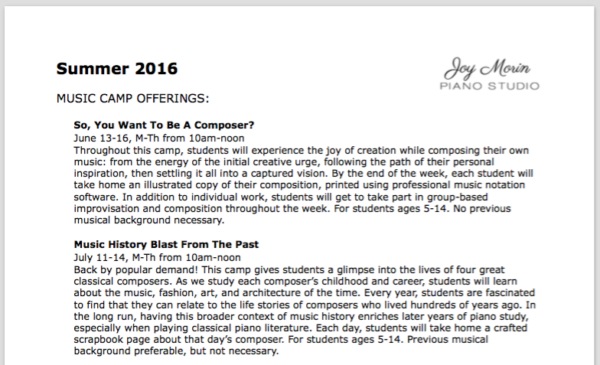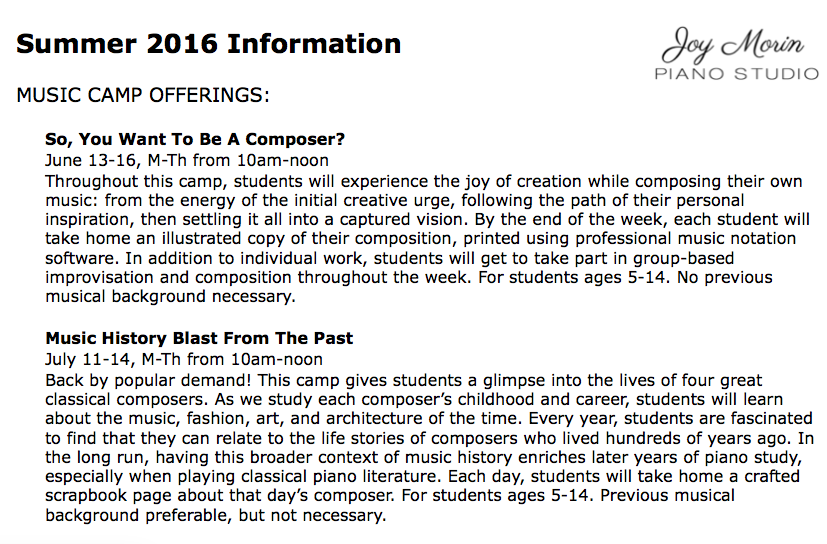The weather is warming, and summertime is practically here! I don’t know about you, but I’m gearing up to offer a couple of music camps this summer.

I first offered a composing camp to my students back in 2012 and have decided it is time to offer something similar this summer. I plan to use my So, You Want To Be A Composer? curriculum while pulling in some newer ideas and resources.
The second camp, Music History Blast From The Past, is one that I have been offering my students for the past four years. We focus on a different historical time period and a specific composer example each day. Students love the hands-on crafting and the discovery of what they can relate to from composers’ lives. I find this camp gives us a great foundation of knowledge for us to refer when learning to play staples of the piano teaching literature. To study each composer, I use the composer lapbooking curriculum that is available in my shop. Check out the general lesson plans here.
Here are the descriptions for the camps I’m offering this year.
So, You Want To Be A Composer?
June 13-16, M-Th from 10am-noon
Throughout this camp, students will experience the joy of creation while composing their own music: from the energy of the initial creative urge, following the path of their personal inspiration, then settling it all into a captured vision. By the end of the week, each student will take home an illustrated copy of their composition, printed using professional music notation software. In addition to individual work, students will get to take part in group-based improvisation and composition throughout the week. For students ages 5-14. No previous musical background necessary.
Music History Blast From The Past
July 11-14, M-Th from 10am-noon
Back by popular demand! This camp gives students a glimpse into the lives of four great classical composers. As we study each composer’s childhood and career, students will learn about the music, fashion, art, and architecture of the time. Every year, students are fascinated to find that they can relate to the life stories of composers who lived hundreds of years ago. In the long run, having this broader context of music history enriches later years of piano study, especially when playing classical piano literature. Each day, students will take home a crafted scrapbook page about that day’s composer. For students ages 5-14. Previous musical background preferable, but not necessary.
What summer camps are you planning this year?
Update: Check out the form I give out to my students in order to present summertime camp/lesson options.



What are the fees?
Hi, Andrew. I offer two summer packages to my students while maintaining that with either option they continue the flat monthly tuition payments as usual. You can view the handout I give out to parents about the summer options in today’s post. Please also check out this post for more info on planning and pricing camps.
I hope that helps!
I am borrowing your music history summer camp format. By the way, both it and your whole website are incredibly helpful and have a part in why my students are thriving, so thank you! I was wondering…. not one person has signed up! It’s been advertised for six weeks, hundreds of flyers I put out house by house, Facebook ads, Craigslist, word of mouth. Even added a trip to my piano tuners workshop on the last day. I think people are expecting way lower prices than I can offer because of competition from non-profits who cover most of their costs through grants. Have you encountered anything similar?
Hi, Sabrina. Thanks for your comment. Most of the sign-ups for my camps are my current private students. I have found it challenging to get sign-ups outside of my studio. I have some success with encouraging current students to invite a friend to attend camp.
One thing I’ve learned (the hard way) is that it isn’t enough to send home the camp info sheet. It’s important to also verbally talk-up the event to my students and their parents. Show them how excited you are about camp, and try to get them excited also.
The first year of offering a music camp is always the most challenging. The following years become easier, because students remember how much fun they had the previous year and want to attend again. Good luck, Sabrina!